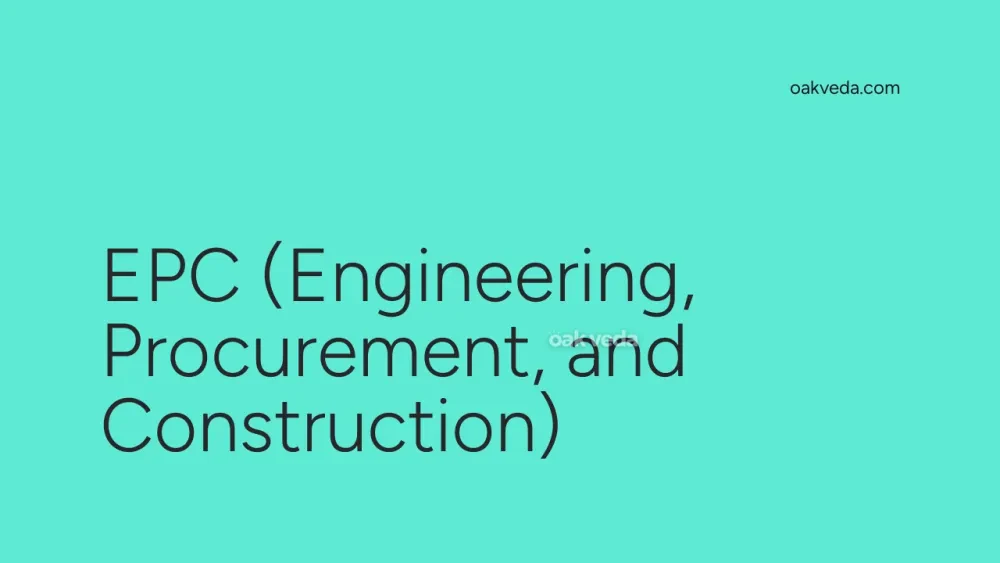
What is the Full Form of EPC?
The full form of EPC is Engineering, Procurement, and Construction. This acronym represents a comprehensive project delivery system widely used in the construction and engineering sectors. EPC contracts define the relationship between contractors and clients, outlining the entire scope of a construction project from design to completion.
What is Engineering, Procurement, and Construction?
Engineering, Procurement, and Construction (EPC) is a contractual arrangement in which a single contractor assumes responsibility for all aspects of a construction project. This includes the engineering and design phase, procurement of materials and equipment, and the actual construction work. EPC contracts are popular in large-scale industrial and infrastructure projects due to their comprehensive nature and potential for streamlined project management.
Origin and Development of EPC
The EPC model evolved from traditional construction contracts to meet the growing demands of complex, large-scale projects. Its origins can be traced back to the mid-20th century when industries such as oil and gas, power generation, and heavy manufacturing required more integrated project delivery methods. Over time, EPC contracts have become increasingly sophisticated, incorporating risk management strategies and performance guarantees.
How does EPC work?
In an EPC contract, the contractor takes on the entire project scope, from initial design to final handover. The process typically follows these steps:
- Engineering: The contractor develops detailed designs and plans based on the client's requirements.
- Procurement: All necessary materials, equipment, and services are sourced and purchased.
- Construction: The actual building or installation work is carried out according to the design specifications.
- Commissioning: The completed project is tested and handed over to the client.
Throughout this process, the EPC contractor manages all aspects of the project, including timelines, budgets, and quality control.
Types of EPC Contracts
While the basic EPC model remains consistent, there are variations in contract structures:
- Lump Sum Turn Key (LSTK): A fixed-price contract where the contractor agrees to deliver the project for a predetermined sum.
- Cost Plus: The client reimburses the contractor for all costs plus an agreed-upon profit margin.
- Target Price: A hybrid model where cost savings or overruns are shared between the client and contractor.
Functions of EPC
The primary functions of an EPC contract include:
- Risk Management: Transferring project risks from the client to the contractor.
- Single Point of Responsibility: Simplifying project management by having one entity accountable for all aspects.
- Cost Control: Providing a clear budget framework, often with fixed pricing.
- Time Management: Ensuring project completion within specified timelines.
- Quality Assurance: Maintaining consistent standards across all project phases.
Applications of EPC
EPC contracts are commonly used in various industries, including:
- Oil and gas facilities
- Power plants
- Chemical processing plants
- Manufacturing facilities
- Infrastructure projects (e.g., bridges, highways)
- Renewable energy installations (e.g., solar farms, wind parks)
Features of EPC Contracts
Key features of EPC contracts include:
- Comprehensive Scope: Covering all aspects from design to completion.
- Fixed Price and Timeline: Often with penalties for delays or cost overruns.
- Performance Guarantees: Ensuring the completed project meets specified operational standards.
- Turnkey Delivery: Providing a fully functional facility ready for immediate use.
- Risk Allocation: Typically placing most project risks on the contractor.
Benefits of EPC
EPC contracts offer several advantages:
- Simplified Project Management: Clients deal with a single point of contact.
- Cost Certainty: Fixed-price contracts provide better budget control.
- Faster Project Completion: Integrated approach can reduce overall project duration.
- Reduced Client Involvement: Less day-to-day management required from the client.
- Expertise Utilization: Contractors bring specialized knowledge to all project phases.
Limitations or Challenges of EPC
Despite its benefits, the EPC model has some potential drawbacks:
- Higher Costs: Contractors may include risk premiums in their pricing.
- Less Client Control: Limited ability to make changes once the contract is signed.
- Quality Concerns: Fixed-price contracts might incentivize cost-cutting measures.
- Contractor Selection: Choosing the right EPC contractor is crucial for project success.
Future Developments in EPC Technology
The EPC industry is evolving with technological advancements:
- Building Information Modeling (BIM): Enhancing project visualization and coordination.
- Artificial Intelligence: Improving risk assessment and project planning.
- Modular Construction: Increasing efficiency through off-site fabrication.
- Sustainability Focus: Incorporating green building practices and renewable energy solutions.
FAQs on EPC Full Form
-
What industries commonly use EPC contracts? EPC contracts are widely used in oil and gas, power generation, infrastructure, and large-scale manufacturing projects.
-
How does an EPC contract differ from traditional construction contracts? EPC contracts provide a more comprehensive scope, with the contractor responsible for engineering, procurement, and construction, unlike traditional contracts that may separate these functions.
-
What is the difference between EPC and EPCM? In EPC, the contractor directly executes the construction work, while in EPCM (Engineering, Procurement, and Construction Management), the contractor manages the construction process but doesn't perform the actual construction.
-
Are EPC contracts always fixed-price? While many EPC contracts are fixed-price (lump sum), there are variations such as cost-plus and target-price contracts.
-
What are some leading EPC companies in India? Prominent Indian EPC companies include Larsen & Toubro Limited, Gammon India, Patel Engineering Ltd., and Hindustan Construction Co. Ltd.
You may be interested in:

